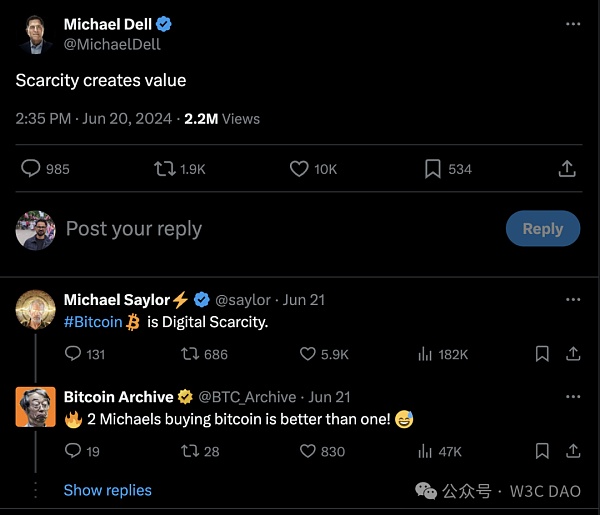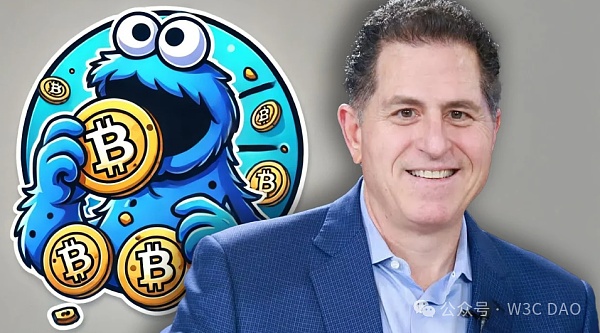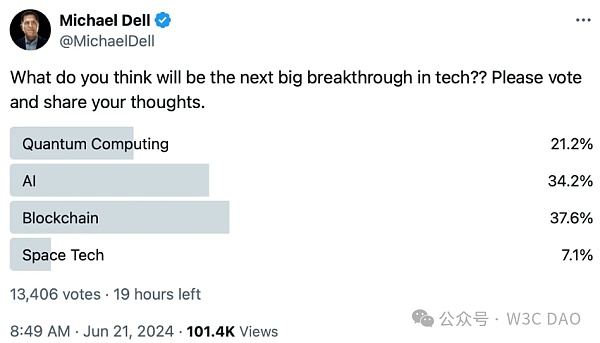Recently, Michael Dell, CEO of Dell, an American technology company known for developing, selling, repairing and supporting computers and related products and services, shared his views on Bitcoin through the social media platform X. The interaction began with a response from Microstrategy founder Michael Saylor.
It can be said that Michael Dell's post on Bitcoin has sparked a heated discussion among cryptocurrency enthusiasts.
Since Michael Dell founded the company in 1984, it has grown into one of the world's largest personal computer suppliers.

On June 21, Dell tweeted that "scarcity creates value," a phrase often associated with Bitcoin because its supply is capped at 21 million and demand is rising.
His tweet quickly caught the attention of Michael Saylor, a well-known advocate of Bitcoin as a corporate financial asset.

The real kicker, then, is that Dell later shared a meme of Sesame Street’s Cookie Monster, possibly generated by AI or photoshopped to show the blue furry guy munching on Bitcoin instead of his usual chocolate chips.
The image was interpreted as: Let’s face it, who among us hasn’t felt like Cookie Monster when looking at those tantalizing cryptocurrency gains?
Now, this little move doesn’t mean Dell is about to go all-in on Bitcoin like Saylor (who owns 226,331 Bitcoins worth $15 billion). But it does make people wonder: Is the tech billionaire developing a taste for crypto? Maybe. Just maybe.
Dell has a long history with Bitcoin, having started accepting Bitcoin as a payment method back in July 2014.
At the time, Dell was one of the largest e-commerce businesses to adopt this strategy. By February 2015, Dell had expanded its Bitcoin payment option to the UK and Canada after a successful pilot in the US. During this time, Dell also ran promotions, including a 10% discount on Alienware products for customers who paid with Bitcoin.
However, things changed in 2017. Despite initial excitement, Dell stopped accepting Bitcoin payments that year. Due to lack of demand, the Bitcoin pilot program was terminated, making it impossible for the company to continue using this payment method.
That same year, several well-known brands, including Steam, also stopped accepting Bitcoin due to network congestion and high transaction fees at the time. The following year, in 2018, Expedia stopped accepting Bitcoin directly.
In parallel with his conversation with Saylor, Michael Dell launched a poll on X, asking the question: "What do you think will be the next big breakthrough in technology?" The options offered included quantum computing, artificial intelligence (AI), blockchain, and space technology.

As of 1:09 PM ET, with 19 hours to go, blockchain leads the poll with 37.6% of the votes (13,406 votes). Considering there is still nearly a day to go, the results could change a lot.
In addition, Dell had $34.6 billion in liquid assets on its balance sheet as of May 3, of which $5.8 billion was cash and cash equivalents, with no mention of Bitcoin, according to a recent filing.
Joe Consorti, an analyst at global macro research firm Bitcoin Layer, believes Bitcoin could benefit from companies like Dell Technologies as they potentially have extra cash as cost-reducing artificial intelligence technology emerges.
“The massive returns on these corporate reserves will provide further cushion for capital deployment during the AI boom, as spending and expansion in computer manufacturing has never been so rapid or intense in decades,” he wrote, adding:
“Dell has $5.83 billion in cash to do this.”
For companies, holding even a small portion of Bitcoin on their balance sheet, say 1%, could give them a distinct advantage over the competition.
For example, if Dell Technologies allocated 1% of its $5.83 billion cash reserves to Bitcoin, or $58.3 million, that investment could grow to $118.7 million in a year based on Bitcoin’s historical annualized return of about 103.5% over the past decade.
 ZeZheng
ZeZheng
 ZeZheng
ZeZheng ZeZheng
ZeZheng Bitcoinist
Bitcoinist
 Bitcoinist
Bitcoinist Bitcoinist
Bitcoinist Bitcoinist
Bitcoinist Cointelegraph
Cointelegraph Cointelegraph
Cointelegraph Cointelegraph
Cointelegraph